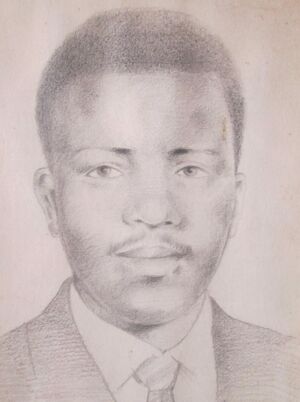Félix-Roland Moumié
(politician) | |
|---|---|
 Félix Moumié (drawing in possession of his brother Moluh Mekue Théodore) | |
| Born | 1926 |
| Died | 3 November 1960 (Age 34) |
| Nationality | Cameroonian |
| Victim of | assassination |
African political leader assassinated by French secret services | |
Félix-Roland Moumié [1] was an anti-colonialist Cameroonian leader, assassinated in Geneva on 3 November 1960 by an agent of the SDECE (French secret service) with thallium, following official independence from France earlier that year.[2]
The French supported a puppet ruler, Ahmadou Ahidjo, in newly independent Cameroon. His support and collaboration during his 22 year rule (1960-82) allowed for continued French influence economically and politically. Ahidjo was faced with opposition from radicals who rejected French dominance, including Félix-Roland Moumié, who succeeded Ruben Um Nyobé (who was killed by the French army in September 1958) as leader of the Cameroon's People Union (UPC)
Biography
Félix Moumié was born in 1925 at the Protestant hospital of Njissé in Foumban, Samuel Mekou Moumié evangelist at the Protestant mission and Suzanne Mvuh. He began his primary studies at the Bandjo school, continued them at the Protestant school in Njissé, then at the public school in Bafoussam (CMI), and completes them at the regional school in Dschang (CMII) where he brilliantly obtained the primary school certificate.
He was sensitized to anti-colonialist and communist ideas during his academic period, notably with Gabriel d'Arboussier (the future Secretary General of the African Democratic Rally) and the historian Jean Suret-Canale
In April 1958, he attended the "Conference of Independent African States" organized by the Ghanaian President Kwame Nkrumah. He befriended Frantz Fanon, who represented the Algerian FLN. Accompanied by Osendé Afana, he went to Congo in 1960 to meet with President Patrice Lumumba, who had shown sympathy for Moumié's cause, but he was then overthrown by Colonel Mobutu's troops, who drove them out of the country. He also went to Egypt where was welcomed by President Gamal Nasser, to Ghana and Guinea where he was welcomed in Conakry by the President of the Republic Ahmed Sékou Touré.
Knowing that he was constantly under surveillance by the French intelligence services, he ensured that he never overflew French territory and avoided as much as possible the airspace of the countries integrated into the French Community. He feared that his plane would be intercepted, as the plane of Ahmed Ben Bella and FLN leaders was in 1956. He lived mainly between Ghana and Guinea where he sought to gain support for the UPC.
The assassination in Geneva
In 1960, in Switzerland, Félix Moumié came into contact with diplomats from the People's Republic of China, bought weapons, had brochures printed, but he also led an expensive lifestyle, revealed by the archives, and gave his trust without sufficient mistrust.
William Bechtel, a former member of the Free French Forces in London in 1940[3] and reservist of the SDECE, the French external intelligence services, was sent to Geneva to assassinate Félix Moumié on the orders of Prime Minister Michel Debré, advised by Jacques Foccard.
Bechtel pretends to be a journalist and invites Moumié to the Plat-d'Argent restaurant in the old town where he poisons him with thallium (formerly used as “rat poison”) poured into his aperitif[4][5]. He drinks a glass of the poisoned alcohol, and while the French expected to die several days later in Conakry, Guinea, he dies before plan by swallowing too much of the poison.
His stomach pain begins at dawn the next day. Transported urgently to the cantonal hospital of Geneva, his death was declared on November 3, 1960 at 7:10 p.m. The French and Cameroonian authorities circulate disinformation hypotheses of an internal UPC settling of accounts or of an assassination by the Russians[6].
The autopsy enabled the Swiss police to quickly trace the trail and search William Bechtel's hotel room on November 17, 1960. The latter had registered at the hotel under his real name. In his memoirs, Paul Aussaresses declares that Bechtel was accompanied by a pretty blonde woman who must have caught Moumié's attention[7].
Bechtel was arrested in 1974. He was released, under pressure from the French government[8], after having paid a bond of 100,000 Swiss francs. His lawyer declares that "the French state did not pay, I went around to ask people, he had friends". The proceedings dragged on and ended in a dismissal on October 27, 1980[9].
References
- ↑ https://books.google.com.au/books?id=nj4jmvPndXwC&pg=PA251&dq=F%C3%A9lix-Roland+Moumi%C3%A9+1926&hl=en&sa=X&ei=7a4LT7rJFqaniALUjP3qAw&redir_esc=y#v=onepage&q=F%C3%A9lix-Roland%20Moumi%C3%A9%201926&f=false
- ↑ Jacques Foccart, counsellor to Charles de Gaulle, Georges Pompidou and Jacques Chirac for African matters, recognized it in 1995 to Jeune Afrique review. See also Foccart parle, interviews with Philippe Gaillard, Fayard - Jeune Afrique in lang|fr and also "The man who ran Francafrique - French politician Jacques Foccart's role in France's colonization of Africa under the leadership of Charles de Gaulle - Obituary" in The National Interest, Fall 1997; Documentary : DEATH IN GENEVA - The Poisoning of Félix Moumié webarchive|url=https://web.archive.org/web/20111007101808/http://www.ictv-solferino.com/Va/programme.asp?prog_id=36703&origine=docs.asp&pos=8&nb=39&recherche=&categ_id=72&sur=&cpt=0 |date=2011-10-07
- ↑ http://archive.wikiwix.com/cache/?url=http%3A%2F%2Fwww.plan-sussex-1944.net%2Ffrancais%2Fbiographies%2Fbechtel.htm
- ↑ Roger Faligot (dir.) et Jean Guisnel (dir.), Histoire secrète de la Ve République, p 113
- ↑ Vincent Nouzille, Les tueurs de la République, Fayard, 2015, p. 49
- ↑ Thomas Deltombe, Manuel Domergue, Jacob Tatsita, KAMERUN !, 2018
- ↑ http://archive.wikiwix.com/cache/?url=http%3A%2F%2Fwww.jeuneafrique.com%2F122578%2Fpolitique%2Fcomment-f-lix-moumi-a-t-empoisonn%2F
- ↑ P. Kropp, Les Secrets de l'espionnage français, Lattes, 1993, p. 509-510
- ↑ http://www.journalducameroun.com/article.php?aid=18794
Wikipedia is not affiliated with Wikispooks. Original page source here